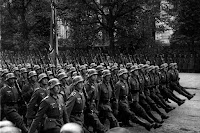 |
Deng Xiaoping |
Where Indic wisdom meets global strategy. Reflections on culture, power, memory and the forces shaping civilizations past and present.
Pages
Monday, July 28, 2025
The rise of nations, the decline of dissent: How Tiananmen paved the way for China's global ascendancy
Sunday, July 27, 2025
Technologies rise, civilizations fall: On the slow decline of modern powers
Saturday, July 26, 2025
The digital mirage: Freedom promised, serfdom delivered
Thursday, July 24, 2025
The illusion of originality: On art, authenticity, and authority
Sunday, July 20, 2025
The heaven on earth that never came: The collapse of capitalist and communist mythologies
Saturday, July 19, 2025
From Pax Americana to Tax Americana: Debt, Power, and the Fall of American Empire
Sunday, July 13, 2025
Truth and reason didn't build civilizations - Fictions and lies did
Across epochs, the victors of intellectual and political struggles have rarely been those aligned with what may be called “ultimate truth.” Instead, power has tended to favour those who wield illusions with conviction, who package complex realities into consumable myths, who wrap propaganda in the sacred garb of certainty.
Civilizations rise not on foundations of transparent truths but on carefully woven tapestries of belief—fictions crafted so meticulously that they come to feel more real than reality itself.
This is not an indictment of humanity, but a reflection on its limits. Human beings, bounded by finite cognition, subjective perception, and cultural conditioning, lack the instruments to perceive ultimate truth in its fullness. Our sensory tools filter experience through lenses shaped by language, memory, emotion, and ideology. What we call “truth” is often but a mirror of our fears and desires, polished by history, inherited from myth, and burnished by power.
How then can one fight for truth, if truth itself is inaccessible? What does it mean to defend an idea that remains undefined, ungraspable, and endlessly contested? These are not merely epistemological questions; they are moral, civilizational, and political.
The great political ideologies—monarchism, liberalism, communism, fascism, nationalism—did not emerge from the patient pursuit of objective truth. They emerged from emotional energies, sacred stories, historical grievances, and the persuasive genius of those who could simplify chaos into narrative. The same holds true for many philosophical systems. The so-called “age of reason” did not displace mythology; it rebranded it. The Enlightenment merely replaced religious myth with secular myth—progress, liberty, rational man—as its new articles of faith.
Even the loftiest civilizations, those celebrated for their wisdom, order, and law, have owed more to their ability to construct shared fictions than to the presence of objective truth. Rome was not built on fact, but on virtus. The Chinese Mandate of Heaven was a metaphysical doctrine, not a verifiable contract. Indian civilization, for all its spiritual profundity, transmitted its deepest truths not through philosophical dialectic alone, but through stories—Itihasa, Purana, Katha—where the line between fact and meaning was consciously blurred.
To say that civilization is the product of lies may sound nihilistic. But perhaps the word “lie” is too crude. What we truly inhabit are useful fictions—constructs that provide coherence, continuity, and a sense of collective direction. A fiction becomes civilizational when it is infused with ethical aspiration and metaphysical depth. When these fictions lose their ethical anchor, they decay into propaganda.
The task, then, is not to denounce the role of narrative, mythology, or belief in shaping society, but to become more conscious of their power. In a world where ultimate truth remains elusive, perhaps the higher calling is to craft noble fictions—ones that elevate, rather than manipulate; that harmonize, rather than divide.
In the end, truth may not always prevail. But the stories we choose to believe in will continue to shape the world—more enduringly, perhaps, than truth itself ever could.









